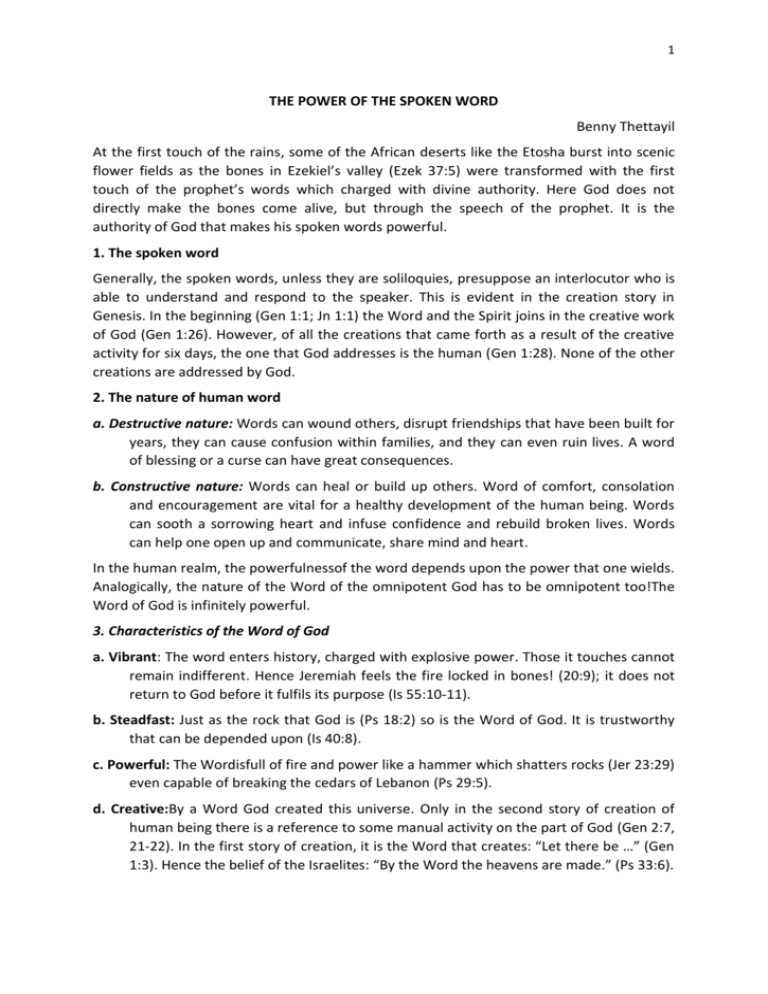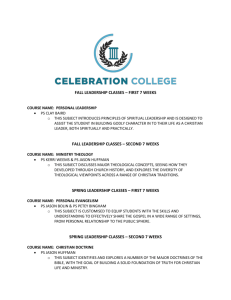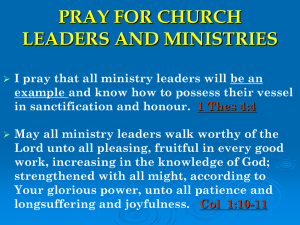The Power of the Spoken Word
advertisement

1 THE POWER OF THE SPOKEN WORD Benny Thettayil At the first touch of the rains, some of the African deserts like the Etosha burst into scenic flower fields as the bones in Ezekiel’s valley (Ezek 37:5) were transformed with the first touch of the prophet’s words which charged with divine authority. Here God does not directly make the bones come alive, but through the speech of the prophet. It is the authority of God that makes his spoken words powerful. 1. The spoken word Generally, the spoken words, unless they are soliloquies, presuppose an interlocutor who is able to understand and respond to the speaker. This is evident in the creation story in Genesis. In the beginning (Gen 1:1; Jn 1:1) the Word and the Spirit joins in the creative work of God (Gen 1:26). However, of all the creations that came forth as a result of the creative activity for six days, the one that God addresses is the human (Gen 1:28). None of the other creations are addressed by God. 2. The nature of human word a. Destructive nature: Words can wound others, disrupt friendships that have been built for years, they can cause confusion within families, and they can even ruin lives. A word of blessing or a curse can have great consequences. b. Constructive nature: Words can heal or build up others. Word of comfort, consolation and encouragement are vital for a healthy development of the human being. Words can sooth a sorrowing heart and infuse confidence and rebuild broken lives. Words can help one open up and communicate, share mind and heart. In the human realm, the powerfulnessof the word depends upon the power that one wields. Analogically, the nature of the Word of the omnipotent God has to be omnipotent too!The Word of God is infinitely powerful. 3. Characteristics of the Word of God a. Vibrant: The word enters history, charged with explosive power. Those it touches cannot remain indifferent. Hence Jeremiah feels the fire locked in bones! (20:9); it does not return to God before it fulfils its purpose (Is 55:10-11). b. Steadfast: Just as the rock that God is (Ps 18:2) so is the Word of God. It is trustworthy that can be depended upon (Is 40:8). c. Powerful: The Wordisfull of fire and power like a hammer which shatters rocks (Jer 23:29) even capable of breaking the cedars of Lebanon (Ps 29:5). d. Creative:By a Word God created this universe. Only in the second story of creation of human being there is a reference to some manual activity on the part of God (Gen 2:7, 21-22). In the first story of creation, it is the Word that creates: “Let there be …” (Gen 1:3). Hence the belief of the Israelites: “By the Word the heavens are made.” (Ps 33:6). 2 e. Salvific: The first historical words of God were words of liberation that God uttered from the burning bush. The command that God gave Moses was to go and liberate (Ex 3:10). The subsequent wordsof liberation through Amos and Ezekiel, words of warning through Jonah and words of judgement through Nathan, Elijah came as the Word of salvation. Coming to the New Testament, the word of Jesus effected immediate healing. The sinners were forgiven (sinful woman, Zacchaeus) brought total healing in spirit and body(Samaritan leper). Caused an immediate response from the part of the disciples at the call (Mk 1:16-20). f. Revelatory: Word (whether human or divine) is “revelatory”. When we speak, our words reveal who we are. When God speaks, his words reveal who he is. God reveals himself to human beings who have the potentiality to respond (Gen 1:28). His Word is alive and powerful. It is sharper than the sharpest two-edged sword, cutting between soul and spirit, between joint and marrow. It exposes our innermost thoughts and desires (Heb 4:12). 4. Vatican II on the WORD Dei Verbum, the dogmatic constitution on divine revelation (§ 21 and 24) instructs us to study God’s Word not just for knowledge, but to change life, to know how to do God’s liberative work in the world. Paul reminds us that the knowledge of the Word is useful only if it leads us to do good to others (2Tim 3:17). Likewise James instructs us to be doers of the word, and not hearers only (Jam 1:22). 5. God-Word correlation The plural usage in Gen 1:26“let us make” and the fact that it is the Word that effects the creative activity of God, points to Jn 1:3 where John tells us that it was through the Word that all things were made and without him nothing was made that had been made. This Word was with God in the beginning (Jn 1:1) and it was the same Word that entered into our history (Jn 1:14). It is this Word that sustains (Mt 4:4; Jn 6:35).It is this Word that is the light to my path (Ps 119:105) and the light of the world (Jn 8:12) in whom the revelations finds its culmination (Heb 1:1-2). 6. Ongoing Revelation Before the departure of Jesus, he promised his disciples that he would send the Holy Spirit, the Spirit of truth, to guide them into all truth (Jn 16:13). The Holy Spirit is active in the Church, in the world, in the nature. Today, the Word of God is powerfully revealed in all these. However, the Word is revealed most powerfully in the Holy Scripture when we read and listen to it with the help if the Spirit. 7. Ministry of the Word The Church was built up thanks to the charisms that various individual members of the Church received from the Spirit, which we call the gifts of the Spirit (1Cor 1:10). A minister of the Word by virtue of the gift that he/she has received from the Spirit, dispenses this gift for the building up of the community. This gift comes along with one’s ability to proclaim the Word of the Lord distinctly, clearly, humbly and in an edifying manner that the listeners 3 are refreshed in their faith. If one cannot proclaim the Word in this manner, maybe, one’s gift is different which calls one to a different ministry in the Church as valuable as the ministry of the Word of God. The objectives of the reader exercising his/her ministry is to make the recorded word of God come alive, to make the written words the Word of God. In doing so, the characteristics of the Word come alive as we read. 8. Performance and ministry A reader’s act of reading is as much a performance as it is a ministry. As one is proclaiming the Word of God, one is advised to perform from the heart. A performer might read aloud to inform, entertain and persuade. A minister reads the Word of God aloud just as a performer does, but with an additional motive to celebrate and to refresh the faith of the listeners. The anecdote about the performer and the old minister reciting Psalm 23 would be in place. After the performance of both of them, the performer would announce: “I know the Psalm, he knows the shepherd.” 9. Ordination and ministry Your priests too are ministers of the Word who consider that "It is not desirable for us to neglect the word of God in order to serve tables.” (Acts 6:2). They receive no automatic skills in ordination to make them better lectors. Hence, the lectors and priests face the same challenge and same purpose of ensuring the Word of God achieve the end for which it was sent by God. The challenge before both is to read the Word of God and make it heard as if for the first time. God’s story and God’s involvement in our world are not an archaic historical narrative, rather, it is an eternal act of love which is unending – ever ancient, ever new. 10. Credibility and appearance Serving as the ministers of the Word, we ensure that our life in the society is worthy of the sanctuary. I do not let anyone in the pews raise an eyebrow as I rise to proclaim the word of God from the sanctuary. Similarly, the manner of my appearance commands respect not only for me, but also for the Word that I proclaim. I constantly watch and get feedbacks on my manners to make them conducive to my ministry. Anything on my part that distracts the audience from the Word would be counter-productive. 11. Sender of the message Consider that the original sender (Jesus, the Apostles, their disciples) disappear in the text. The act of reading brings the author alive. The original audience heard twoadditional unspoken languages, namely, inlocutional language and perlocutional language. The inlocutional language is the particular emphasis laid on a particular phrase, the intensity with which a statement is made, the intonation and the gestures made in nonverbal communication. Perlocutional language has more to do with the listeners. It denotes the effect that is part of the message, which is generally not coded in the text. Consequently, the nuances are lost to today’s hearers. Learning a bit of the background both of the author and the community that the author addresses, will, to a certain extent bring back the 4 inlocutional and perlocutional languages back and make the proclamation far more effective. 12. Conviction and experience Conviction of and in what we do enhances the effectiveness all that we do. When one proclaims with conviction, one helps the listeners to confirm their conviction. Conviction comes from experience. Hence, we find that the prophets who were sent to proclaim the Word to the Israelites, narrate their experiences with the Word. The scroll eating prophet (Ezek 3:3), the amber kissing prophet (Is 6:7), the prophet on fire (Jer 20:9) and many more point to the experience that they had prior to the commission that they received to proclaim the Word. This experience makes our proclamation credible. Without this experience, we become a noisy gong or a clanging cymbal (1Cor 13:1). Hence, let us know both the Psalm and the shepherd.







